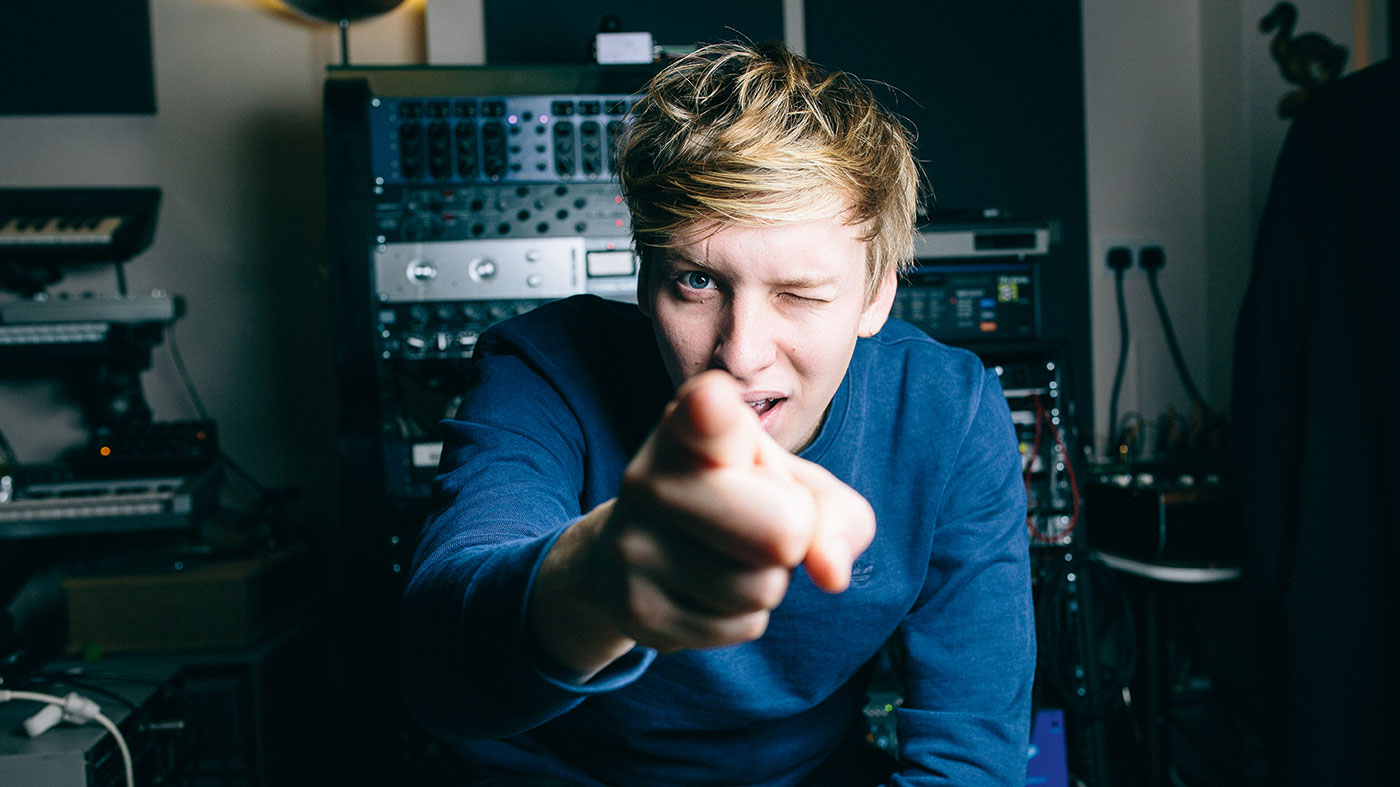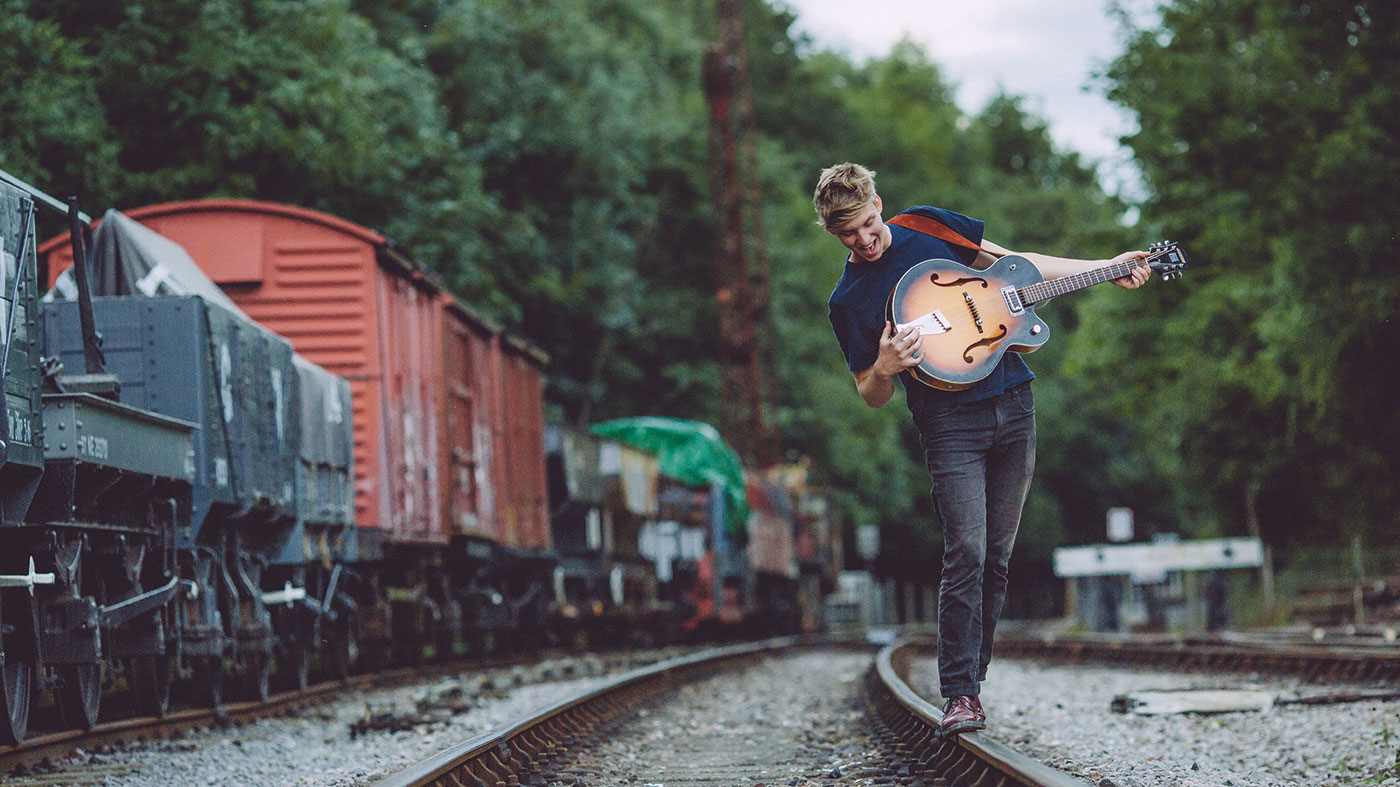George Ezra: "People have success and then want to prove that they've got their grade 8 on guitar"
The singer songwriter talks success, solitude and second albums

Want all the hottest music and gear news, reviews, deals, features and more, direct to your inbox? Sign up here.
You are now subscribed
Your newsletter sign-up was successful
The inimitable, dulcet-toned, platinum-selling wunderkind returns with a new single. We met him to chat second-albums, Gretsch guitars, drawn-on F holes - and the small matter of a career-changing Glastonbury appearance.
In precisely three days time from when we speak, George Ezra will perform in front of the second biggest crowd of his short career, at this year’s Glastonbury Festival. Having already conquered the festival’s Pyramid stage - an area that boasts a colossal capacity of around 100,000 people - back in 2015, performing on the Other Stage will be a walk in the park.
The magnitude of both the occasion and his performance at the Somerset-based festival should not be underestimated. Not only will it signal his sought-after return to the UK scene, there's an added significance: this will be his fourth time at the very festival which kickstarted his blistering rise (with his attention-grabbing performance on the BBC Introducing stage in 2013).
I'd always dreamt of being a musician and performing in front of people, but I'd never considered what comes with that
At the time, George was still a relatively unknown, angelic-faced 20-year-old. His strikingly low, dulcet tones completely juxtaposed his cardigan-clad aesthetic and endearing demeanour. His uniqueness and potential were unquestionable. But he was still perhaps one great song away from being commercially viable enough to graduate to the bigger stages. Just one year later, however, things were very different.
The release of his radio-friendly, mega-hit, Budapest had catapulted his deep, soulful voice into both the ears and hearts of the entire British public - and had earned him a slot on the prestigious John Peel Stage in the process. So, when he returned to Glastonbury in 2014 - the day before his debut album Wanted On Voyage was released - he was greeted by a brimming tent of festival-goers in full voice, all eager to get their slice of what would go on to be the song of the summer. To date, Budapest has sold a remarkable 1.2 million units in the UK alone - not bad for a track he composed using the first three chords that his Dad had taught him.
His debut album also enjoyed huge success. Despite initially missing out on the top spot, it eventually hit number one later that year, and also became the third best-selling album of 2014. Within just 16 months of that first, innocent performance at what George describes as "the best fucking festival in the world", the polite, young, ‘university dropout’ from Hertford had gone from utter obscurity, to being a household name. From open mic nights in empty pubs, to performances on high profile, Saturday night chat shows. He was living his dream, but having to chinwag with glitzy celebrities on TV sofas wasn’t what he signed up for - and neither was fame.
"If I'm completely honest, it's the one thing of everything that I hadn't kind of pre-empted,” he admits. "I'd always dreamt of being a musician and performing in front of people, but I'd never considered what comes with that. I don't think it's changed me, but maybe one day we will be sat here having this conversation and I'll have shades on."
Want all the hottest music and gear news, reviews, deals, features and more, direct to your inbox? Sign up here.
Grounded
That seems unlikely. After George kindly offers to buy us a drink (his PR jokingly reminds him to not splash the cash just because he’s had a hit record), George then quietly and reluctantly draws our attention to the Primark shorts he’s wearing - clearly embarrassed enough that he feels the need to point them out. If nothing else, it’s an exchange that acts as further testament to how levelheaded and humble he has remained.
I think the word ‘celebrity’ is misunderstood, because a celebrity can just be someone you recognise
Where a number of commercial artists would rather be seen in a club mingling with socialites than in a recording studio honing their craft, George is the complete opposite. And he was never going to let sold-out tours and a number one album cloud either his judgment or principles.
"I always found it funny when people, on their time off, get caught in the press or go to trendy parties. I’m like, ‘you’re never at home, you might only get two nights off and you're going to choose to knock your mates from home on the head to go out and meet some people just because you've heard their name before?’
"I think people see it as a way to benefit their job, but it just doesn’t sit well with me. I don't really feel like a celebrity. I feel like there's a certain amount of fame connected to my name, but it’s about the music. I think the word ‘celebrity’ is misunderstood, because a celebrity can just be someone you recognise."
Following an excessive amount of time on the road, George started to struggle with the idea of having to slip back into normality as the campaign for the first album came to an end. At the time, he’d spent nearly two years "in this bubble", in which everyday had a purpose and was carefully planned out for him. So, waking up each day without structure and having to write a new album was always going to be a challenge. He started to feel without reason and admits that he found it tough.
"I'm not belittling the job I do, because I consider myself extremely lucky," he explains. "But I get quite envious of friends of mine who have structure to their life because I really struggled with the lack of structure to my life," he says. "I was waking up each day with the aim to write, but you can't turn it on and off.
"You're relying on creativity and you just can't rely on creativity - some days you'll wake up and nothing comes. I still live in the town I grew up in and all my friends still live there, so going back into that side of it I found really easy. But [on tour] you’re institutionalised and I’ve missed that."

Levelling out
As well as struggling with having to wait weeks at a time before even a whiff of musical genius would materialise, the rollercoaster ride of emotions that George experienced whilst on tour also contributed to his feeling of purposelessness.
George explains that, whilst on the road, he’d be experiencing the most extreme highs - but also some sinking lows. Being in the rare position of being able to look out at the thousands of fans singing back at him each night was an addictive feeling, but the comedown in between those shows would be just as prevalent.
"Most days on tour are fucking boring, so you do experience the most extreme lows. You get there and you're lucky if you can see outside from backstage. But to then come out of that and not have either the lows or the highs takes getting used to. It's just ‘normal’, but once you get back in the swing of it, ‘normal’ is beautiful."
Desperately in need of inspiration and a "reason to do a record", George revisited one of the nine European cities that he had previously backpacked around after signing with Columbia Records at the age of 19 - Barcelona. The aim was to spend a month living out of his comfort zone in order to fuel creativity and write from a more personal viewpoint.
He’d spend his days just "walking here, there and everywhere at the pace of a funeral march" without a care in the world, whilst filling up notebooks with lyric ideas and specific details of his experiences. It was an approach not to dissimilar to the one he took for the first album. But if he was treading uncharted waters last time, this time he was swimming in them.
After two days of not seeing another person [in Norfolk], my brain just snapped off - it was weird, but good
"I rented and agreed to live with a complete stranger. I could have gone to a nice hotel, but for what? I didn't want to get my reasoning for doing it confused with my name. I think you kind of owe it to the project to go and do something that isn't the norm."
Reinvigorated and equipped with fresh stimuli, George’s time at home after returning from Barcelona didn’t last long. Ever the traveller, he quickly concluded that another trip was needed in order for his newfound experiences and ideas to be molded into hit-songs. This time, however, it would be a much more isolated affair.

"The other trip I did was one to Norfolk and I stayed in this cabin. There was no electricity and you could see a pig farm out in the distance. After two days of not seeing another person, my brain just snapped off - it was weird, but good. I think you just slow down a bit and you get the opportunity to just think about everything going on around you."
Living without electricity for four weeks and having to shower outside in a field may not sound like the most suitable of living conditions in which to write an album, but George’s time alone proved as productive and as beneficial as he would have hoped. Returning to the real world with an abundance of new songs - some his most personal, others his best yet - he headed to the studio to flesh them out.
By the end of the writing sessions, he had nearly 50 tracks to choose from - all of varying quality, admittedly - but 50 nonetheless. Cameron Blackwood - who worked on Wanted On Voyage - was brought in to produce the record, along with Budapest co-writer, Joel Pott. Very much running with the ‘if it’s not broke, why fix it?’ approach, George ran the risk of cloning his debut, instead of making an obvious progression. But as he emphasises, it's only the second album.
I think when people have a bit of success, there's a tendency for them to go, 'F*** it! Get Rick Rubin on the phone'
"I think when people have a bit of success, there's a tendency for them to go, 'Fuck it! Get Rick Rubin on the phone'. I'm not bad-mouthing Rick Rubin," Ezra clarifies. "I'm sure it would be great to do a record with him, but I hate it when people have success and then try and do something 'cooler'. They might have a pop hit, but then next time they'll want to prove that they've got their grade eight on guitar. The new songs seem like a progression, but without reinventing the wheel in terms of ‘George Ezra’."
While his new album isn’t going to alienate any of the fans he obtained as a result of the first record, it does differ in that it favours acoustic guitars over the more synthetic sounds he used on his first release. It was a decision that has undeniably made for a less processed and more organic sounding body of work - and one that has paved the way for a newfound lyrical poignancy.
"It was hard," he admits, referring to his more personal approach to writing lyrics. "Before, I was doing this thing where I was purposely trying to make it harder for people [to understand the meaning behind the lyrics]. Then I just realised there's not really any point in doing that. This record, I think, is in two halves, but there is this running thread of escapism through every song. I think half of the record is made up of just love songs based around the idea of escaping together."
Clueless
As well as having to deal with the pressures of writing the follow-up to a 4x Platinum-selling album, George was also starting to suffer from anxiety as 2015 drew to a close. Initially oblivious, he decided to settle on the assumption that the way he was feeling was just a natural reaction to the uncertainty that awaited him after touring. In hindsight, he wasn’t completely wrong, but not having a carefully crafted, day-to-day plan wasn’t the only reason.
If someone is depressed, you wont see anything - there are no signs. And because you can hide it, I think people don't think they can talk about it
"I think a big part of it is just that the modern world is quite a full-on place. You can wake up at 6am and the first thing you see now is a breaking news thing and starting your day like that is no good. I was feeling uneasy over things that I had no control over. I think everything you go through in your early twenties can feel like the first time it's happened to anyone, but looking around and realising that not one of us have a clue is relaxing."
Despite recently being particularly open about his battle with anxiety - he’s addressed the issue in both interviews and on comeback single, Don’t Matter Now - George is understandably hesitant to say it’s his job to raise awareness just because of his platform. He does, however, strongly insist that it’s a good thing for people to hear other people talking about it.
"If I broke my leg and you looked at it, it would look fucked up. Whereas if someone is depressed, you wont see anything - there are no signs. And because you can hide it, I think people don't think they can talk about it or they maybe don't see it as a real thing."
George’s feelings of anxiety have also led him to consider the potentially damaging amount of pressure that young people put on themselves to become famous. He also admits to being baffled by how major labels rely on young adults being able to articulate how they are feeling in a song that's then commercially viable. It’s a concept that he struggles to get his head around, but concludes that it is not the fault of any record labels.
"If people grow up thinking that it’s fame they want, then they're going to be on a road to ruin and that’s the issue - the issue doesn’t lie with the labels. You can be famous for being a scientist, for art, sports, music - forget about people knowing who you are. Don't just do nothing and strive for people to know who you are. Do something and forget about wanting people to know who you are."
Since being back on the road, George admits he’s felt a lot more at ease and his anxiety has thankfully taken some time off. But should it rear its unwanted head for a second time at the end of his forthcoming album campaign, George already has a plan put in place to combat it.
Having f*** all to do did my box in and I don’t think it’s healthy for people. I’m not a workaholic, I just think it’s nice to have a reason
"In hindsight I think when I finish this second record campaign, I will consider going to get a job or helping out at a school because then it’s something to do regularly. Waking up every day and having fuck all to do did my box in and I don’t think it’s healthy for people. I’m not a workaholic, I just think it’s nice to have a reason."

The family bible
Something he did dedicate an enormous number of hours to, was the guitar he first learnt to play on what he now refers to as the, ‘Family Bible’ - a £20 classical guitar that both he and his brother desperately seek ownership of.
It’s still the first thing he picks up whenever he visits home, but after a brief stint with the now discontinued Fender FR-50 Resonator at the start of his career, he’s currently the proud owner of a 1959 Gretsch Anniversary guitar. Despite being very much the statement piece of his previous live setup, however, George has retired its live outings.
"The 1959 Gretsch is too nice to tour with. I toured with it on the last album campaign and we were dropping it down into C, so we had to pin the bridge and it just wasn't right. You just realise that it shouldn't be flying all around the world. It’s beautiful, but it should be for the studio or at home."
While his decision to acquire a big-bodied Gretsch and tune it down to C helped to compliment his low, vocal register, it also made him stand out at the many open mic nights he performed at during the start of his career.
Tuning down was a way of me saying, ‘Yeah there might be eight other guys here with guitars, but listen to me.’
"You'd get onstage with a guitar that looked normal, but then you’d play a chord that everyone was aware of and they'd go 'hang on a minute'. I got some fat strings, but I didn't go straight to C, I tuned it down to D first. It was a way of me saying, ‘Yeah there might be eight other guys here with guitars, but listen to me.’
Staying true to his love of Gretsch guitars, George has now acquired the Gretsch Tennessee Rose. Famed for being George Harrison’s go-to six-string, its F holes are merely drawn on in order to bolster the look and not the sound - something that George [Ezra] wasn’t initially keen on.
"When they first showed me it, I looked at it and thought it looked a bit naff because the F holes are just drawn on. But they said they'd always been that way and the F holes are just there for effect. On the bigger stages it really helps you with feedback and with volume."
Three days after our conversation, George strolls out onstage at Glastonbury in front of a phenomenal turnout. His hit songs spark mass sing-alongs, and the new ones are received like old favourites. His sunny smile breaks through the cloud of uncertainty that’s been bestowed upon him for the last 12 months, and the catchy refrain of his new single Don't Matter Now seesaws back and forth, between the stage and the audience.
Given his recent state of mind, we at first struggle to grasp why his anxiety-influenced new track, is musically such a poppy composition. But then we remember what George told us three days prior. "I would always much rather sing a happy song about hard times. I don't always see what good can come from reminding people in a sad way."
As we spot a guy dressed as Iron Man dancing beside us - free of inhibition and singing every word - it all starts to make a little more sense.
George Ezra's new album will be released later this year.

